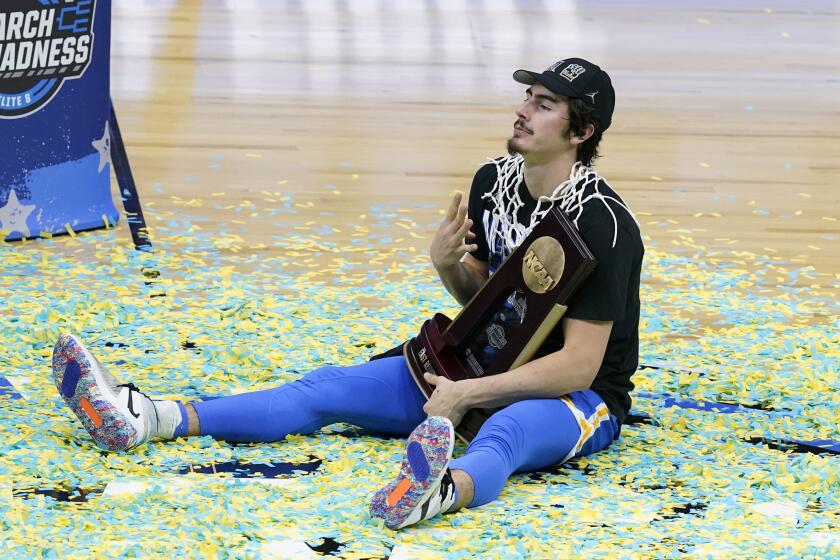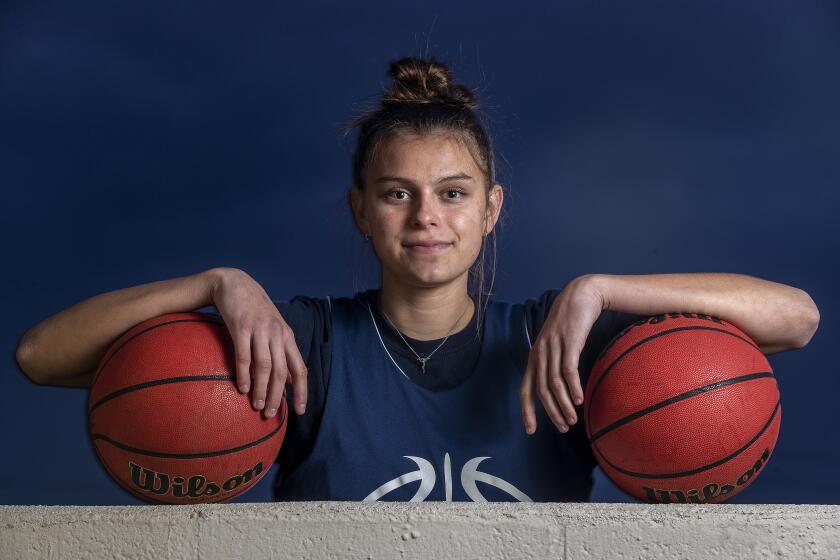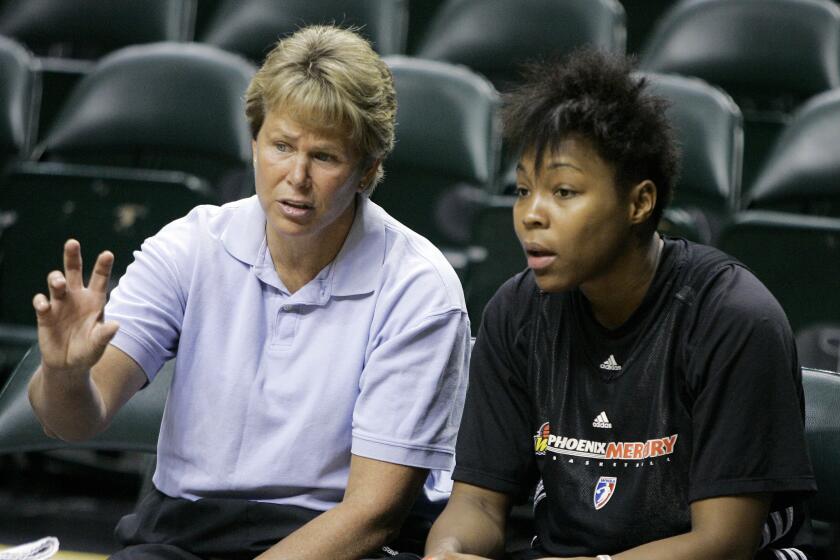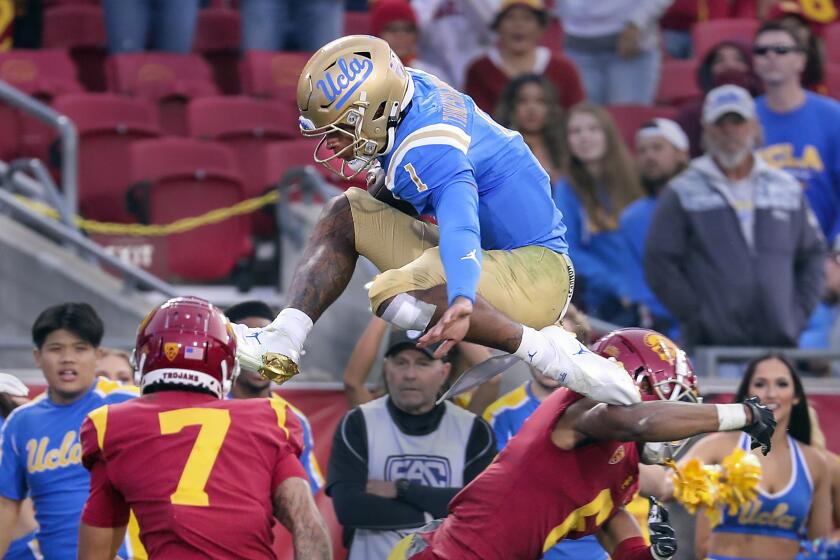Gabriela and Jaime Jaquez Jr. hope to pick up where Ann and Dave Meyers left off
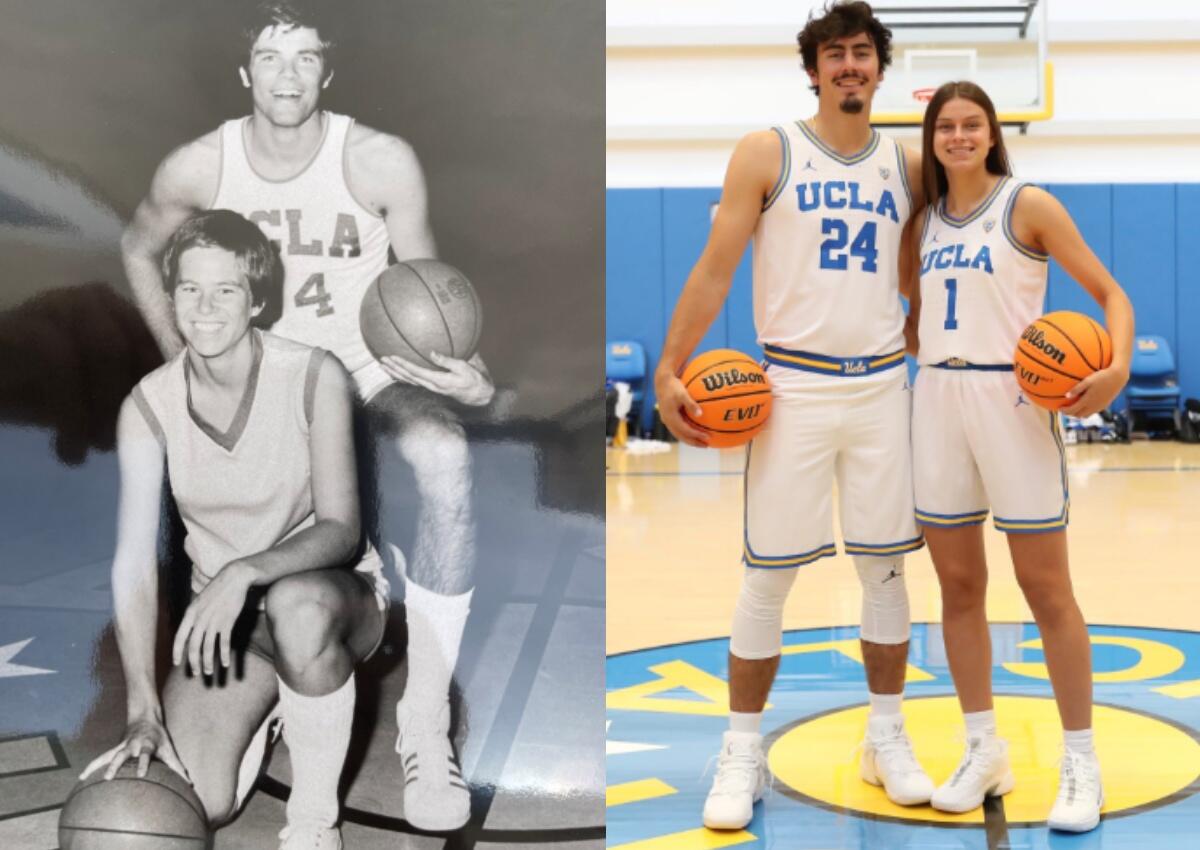
- Share via
It’s a brother-sister act that UCLA has seen once before.
Big brother is in his last college season. Little sis is just getting started.
Both are as tough as the hardwood they freely dive onto in pursuit of loose balls.
Nearly a half-century ago, it was Ann and Dave Meyers. Now it’s Gabriela and Jaime Jaquez Jr.
The last time the Bruins experienced this sort of sibling splendor, it ended in banner seasons. Dave Meyers led his final college team to a national championship in 1975, which also happened to be the coda for coach John Wooden. Three years later, as a senior, Ann propelled the UCLA women’s team to its first — and only — national title.
Several months ago, as she watched a practice inside the Mo Ostin Center, her feet planted on Ann Meyers Drysdale Court, Gabriela Jaquez’s eyes drifted skyward to that Assn. for Intercollegiate Athletics for Women banner won in 1978. A discussion ensued about the meaning of that achievement, coach Cori Close saying not to discredit a title won four years before the NCAA began crowning women’s champions.
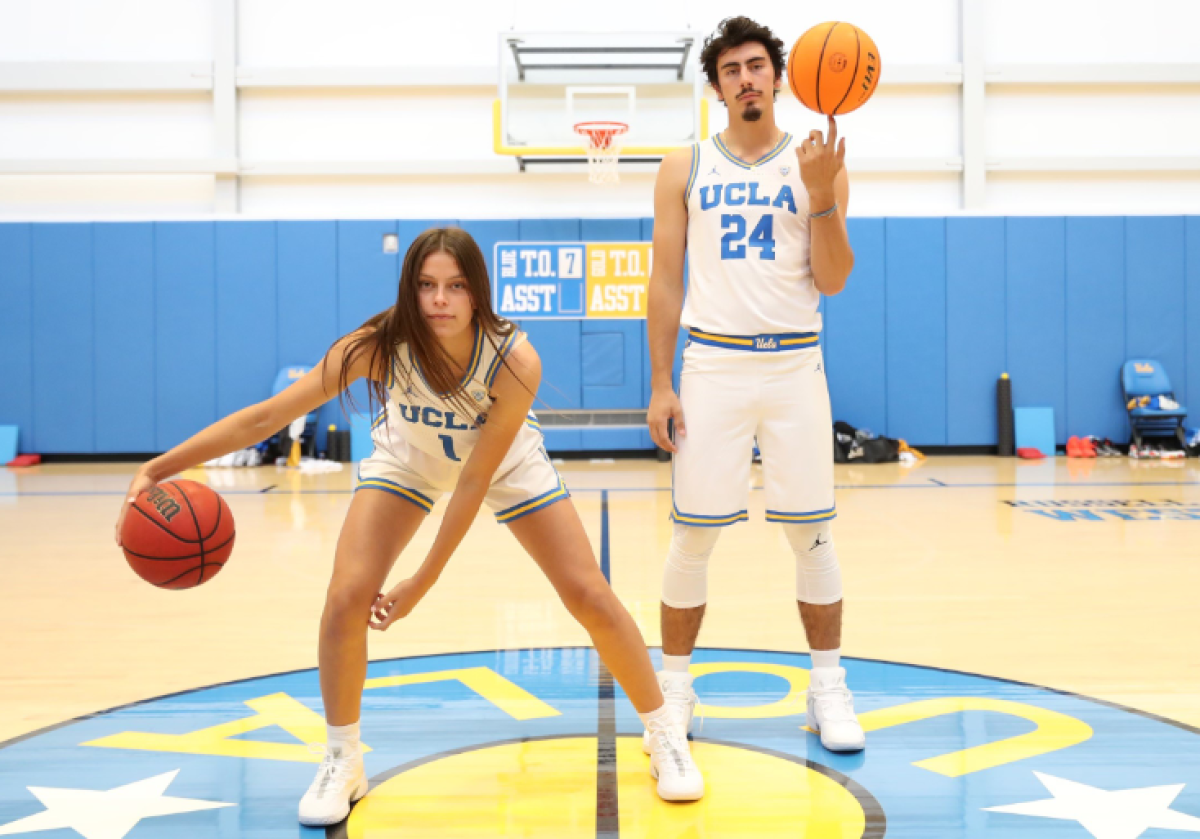
Showing her usual spunk, Gabriela had the last word.
“I was like,” she recently recalled, “ ‘OK, then we’ll be the first NCAA champions.’ ”
Watching from afar, her decades-long career in basketball having led to a role as vice president of the NBA’s Phoenix Suns and the WNBA’s Phoenix Mercury — as well as a broadcaster for both teams — Ann Meyers Drysdale wished her sibling successors similar success.
“He’ll be a senior, she’ll be a freshman,” Meyers said of the Jaquezes. “Kind of like when Dave and I were there.”
They’re aggressive, versatile, willing to do anything to help their team.
Descriptions that applied to Ann and Dave Meyers also fit UCLA’s latest sibling duo, forging their identity every bit as much as the last name that adorns the back of their jerseys.
Jaime Jaquez Jr. won an army of admirers during the Bruins’ run to the 2021 Final Four when he crawled several feet on the court to chase down a ball against Michigan. Last season, when balky ankles limited his mobility, he adopted the sort of old-man’s game you might see at a local rec center, repeatedly scoring over baffled defenders.
UCLA sophomore Jaime Jaquez Jr. is carrying on a legacy that includes other former Mexican-American Bruins such as Earl Watson and Lorenzo Mata.
Gabriela has long mimicked her brother’s get-it-done style while becoming the most prolific female prep scorer in Ventura County history. The 6-footer became a master at creating contact, sometimes taking 20 free throws in a game on the way to averaging a record 34.2 points last season for Camarillo High.
Of course, in one-on-one battles with a brother seven inches taller, that average dipped considerably.
“I’d score on him and then he goes, ‘Do you actually want me to go hard? Do you want me to be serious?’ ” Gabriela said. “And I’m like, ‘Uh, yeah. Let’s go. Like, run it.’ And then he’ll just go by me and dunk. It’s OK, it’s just a reality check. But it’s fun.”
Jaime remembered his sister always giving the same four-letter answer during childhood conversations about where they wanted to go to college. Recently, Gabriela and her mother discovered a worksheet she had filled out during a third-grade camp. Asked about her basketball goals, Gabriela wrote: Average 20 points in high school and go to UCLA.
Camarillo basketball standout Gabriela Jaquez will follow in her brother’s footsteps by playing for UCLA while taking pride in their Mexican heritage.
It was nearly a prophecy unfilled. Beset by an erratic three-point shot, Gabriela didn’t hold any scholarship offers after her sophomore season at Camarillo despite averaging more than 20 points. She made long-range shooting a focus of her workouts, leading to an uptick in accuracy that resulted in a UCLA offer and some wide-eyed amazement when she found that worksheet.
“Both me and my mom looked at it,” Gabriela said, “and we were like, ‘Oh my gosh.’ ”
Ann Meyers was known in UCLA basketball circles long before her arrival on campus. Big brother made sure of it.
“Dave had often talked about his younger sister Annie and how good of a player she was,” said Marques Johnson, a sophomore during Dave’s senior season.
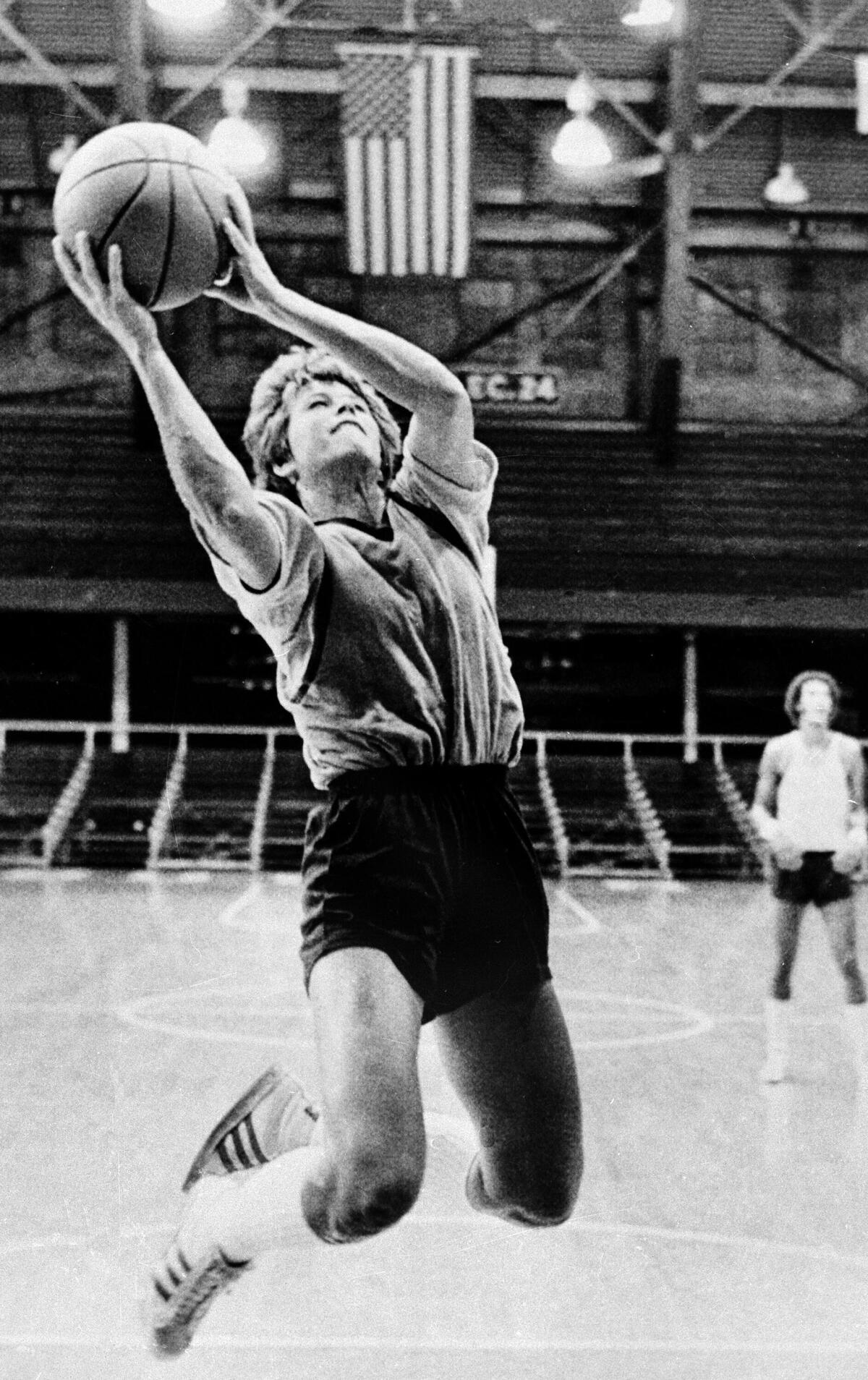
The middle child in a sports-crazed family of 11 siblings — Patty, Tom, Mark, Cathy and Dave on one side and Jeff, Susie, Kelly, Coleen and Bobby on the other — Ann was always trying to outdo everyone else. She once attempted to match Dave’s 15-step leap down the stairs in their two-story La Habra home, landing about three steps short and breaking her ankle.
A 5-foot-9 dynamo who could play all five positions, Ann competed against — and often beat — boys while playing on coed teams since the fifth grade, her inclusion on the roster requiring special permission from the local PTA. Her groundbreaking ways continued when she became the first high school player to make the U.S. women’s national team.
All of this would have made her a natural target for UCLA, even if she didn’t have a brother playing for Wooden. One weekend, Dave brought his roommate, Kenny Washington, to a family barbecue. A member of Wooden’s first two national championship teams who was now on the verge of coaching the UCLA women’s team in its inaugural season, Washington had more on his mind than grilled meats.
This was a recruiting visit.
Ann Meyers Drysdale, the first woman to receive an athletic scholarship at UCLA, says Title IX created opportunities for her that were once closed for women.
Together, Kenny and Dave pitched Ann on playing for the Bruins on scholarship. The financial aid was a relatively new opportunity in the wake of Title IX’s adoption two years earlier. At the time, Ann was unsure of her plans, thinking maybe she would go to Cal State Fullerton because she knew the coach and it was where her sister Patty had won a national title in 1970.
Now she was being pulled in an unexpected direction.
“Me being so young, I probably didn’t understand really what it meant,” Ann said of the offer that would make her the first female to attend the university on a full athletic scholarship. “You’re going to let me come to UCLA and be a student there and get an education and also play sports?”
The final lure was most meaningful: She would get to play at the same school as her brother.
Known as “The Spider” because he was all arms and legs, Dave was a 6-foot-8 bundle of energy who once earned a technical foul for slapping his hand on the court in disgust when he disagreed with a call.
He also became something of a protector once his little sister arrived on campus. Dave’s friends and teammates teased Ann about how she couldn’t date any of them because they feared Dave’s wrath.
The family resemblance was evident from Ann’s first game. Upset about a call, she hurled a basketball at an official, knocking the wind out of her. A technical foul was called. Ann was sent to the bench. A message was delivered.
“My greatest joy was probably my freshman year watching David play.”
— Ann Meyers
“When she gets on the court, she is so frickin’ competitive — just like Dave — they’re cut from the same cloth, but just beautiful people off the court,” said Johnson, who started at the other forward spot during Dave’s final UCLA season and played alongside him for two more seasons with the Milwaukee Bucks. “When they cross the line, they become psychotic, maniacal competitors that have the ability to will their teams to a championship level.”
Dave won a title as a contributor off the bench on the undefeated UCLA team that won the national championship in 1973. Now, as a senior, he was the frontman for a team that was trying to rebound from its 1974 NCAA tournament loss to North Carolina State — ending a run of seven consecutive national championships — not to mention the departure of stars Bill Walton and Jamaal Wilkes.
Ann and Dave attended each other’s games when their schedules permitted, the men’s team regularly playing in front of sellout crowds at Pauley Pavilion while the women attracted only a smattering of fans to games staged on a side court.
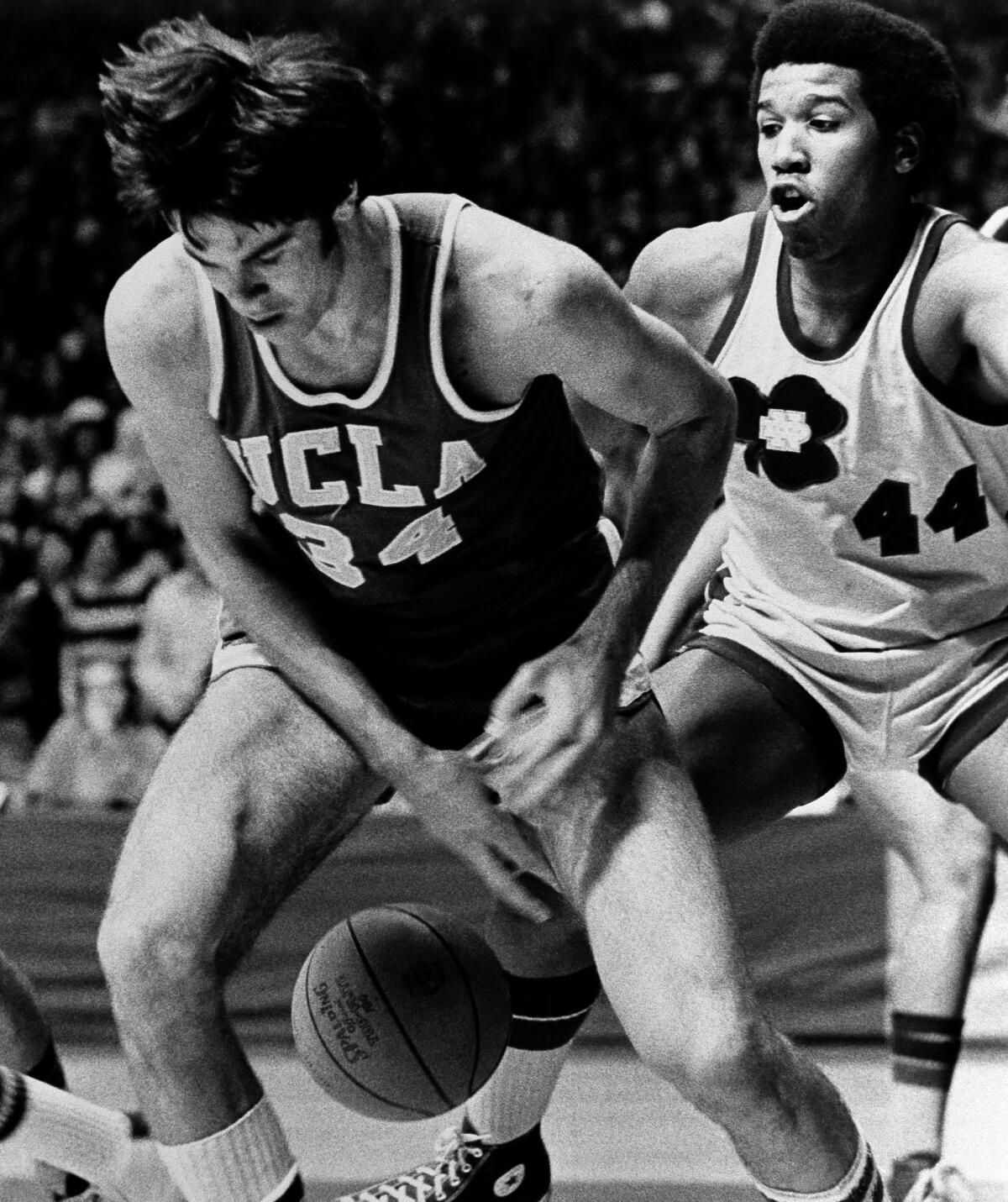
“My greatest joy,” Ann said, “was probably my freshman year watching David play.”
The entire Meyers family made sure to clear their calendar for the season’s final weekend. Dave and the Bruins were headed to San Diego — his and Ann’s birthplace — for a chance to win the national title. Wooden informed his team after it defeated Louisville in the semifinal that the championship game against Kentucky would be his last as a coach.
Rising to the moment, Dave had 24 points and 11 rebounds, but his emotion nearly wrecked everything. The Bruins led by one point with six minutes left when he rose for a jumper while colliding with a defender. The whistle blew. Offensive foul.
Howling in protest while he slapped the court with his hand, Dave was assessed a technical foul. A long delay ensued as Wooden rushed onto the court to confront the official. But Kentucky missed the technical free throw and the front end of the one-and-one. The Wildcats then turned the ball over. UCLA would persevere for a 92-85 triumph, a happy sendoff for Wooden and his star player.
“David played spectacular as always and played with his heart, and I just always admired the way he put himself out there,” Ann said. “I wanted to play that way too.”
At the start of Ann’s career, the inequities between the UCLA men’s and women’s teams were far more pronounced than they are today. Admission to women’s games was free. The team often traveled by station wagons or a van, most trips confined to some nearby destination that would allow them to return immediately after games.
One similarity between the programs was by design. Washington ran his team through the same drills he had learned under Wooden, who sometimes watched the women practice from some shadowy corner so that his presence wouldn’t cause a commotion. Already a fan of the women’s game because of its focus on fundamentals, Wooden became an even bigger admirer of Ann Meyers.
“I mean, we both want to win a national championship. That’s obviously the ultimate goal.”
— Gabriela Jaquez
“I just remember him talking so highly of her at all times,” Johnson said.
Ann’s well-rounded approach was on full display midway through her senior season, when she became the first college player — male or female — to log a quadruple-double by tallying 20 points, 14 rebounds, 10 assists and 10 steals against Stephen F. Austin.
Being a star’s little sister wasn’t always easy. During a game at Maryland, while stuck on the bench in foul trouble, the crowd taunted her by chanting, “Send in Dave Meyers’ little brother!”
Ann got her revenge two months later when the Bruins toppled Maryland, 90-74, inside Pauley Pavilion to win the AIAW title, capping her career as a four-time All-American. Dave couldn’t be there because of a prior engagement — starting at forward for the Bucks — but Ann’s older brother Mark hoisted her onto his shoulders to cut down the nets.
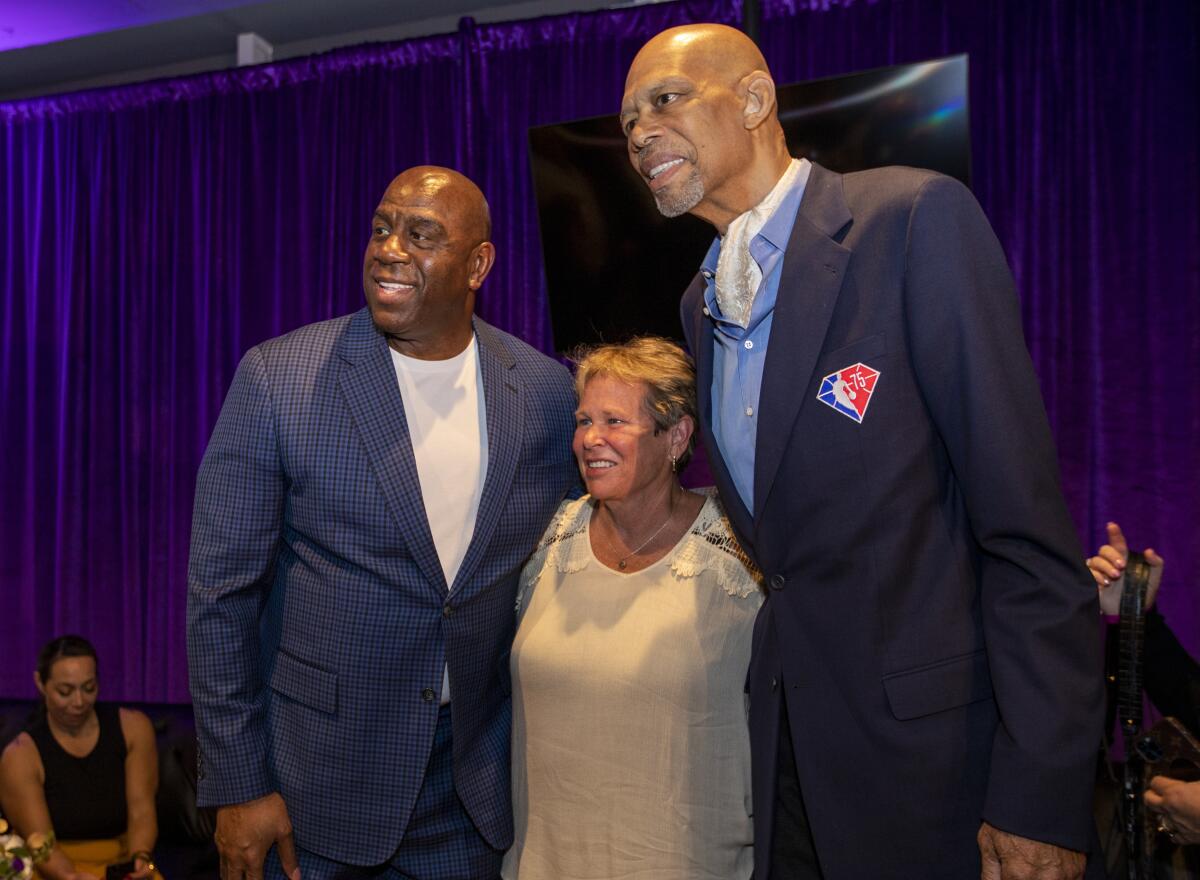
Dave had arrived in Milwaukee after being part of the trade that brought Kareem Abdul-Jabbar to the Lakers in 1975, only a few weeks after the Lakers had drafted Dave with the second overall pick. After five injury-plagued years, Dave retired in 1980 because of his convictions as a Jehovah’s Witness, allowing him to complete religious volunteer work while spending more time with his family.
He remained feisty until his death in 2015 after a short battle with cancer. Lying in his hospital bed, eyes closed, as his son, Sean, and sister Cathy discussed his totals in his final UCLA game, Dave corrected, “No, I had 24 points and 11 rebounds.”
Before she left UCLA, the once painfully shy Ann enrolled in broadcasting classes that would change the trajectory of her career. She earned a tryout with the NBA’s Indiana Pacers and was selected No. 1 overall by the New Jersey Gems of the Women’s Professional Basketball League, where she flourished for three seasons, but has spent far more time calling games than playing them in her 43 years as a broadcaster.
The University of California will scrutinize UCLA’s Pac-12 exit and issue a public report on the impact on student-athletes and financial fallout on UC Berkeley and other campuses, following Gov. Gavin Newsom’s demands for clarity.
She has no doubt what left the biggest imprint on the game.
“I do believe to this day,” said Ann, 67, who was married to Dodgers great Don Drysdale before his death in 1993, “that myself and women’s basketball would not get the attention that it drew unless I go to UCLA and be with my brother.”
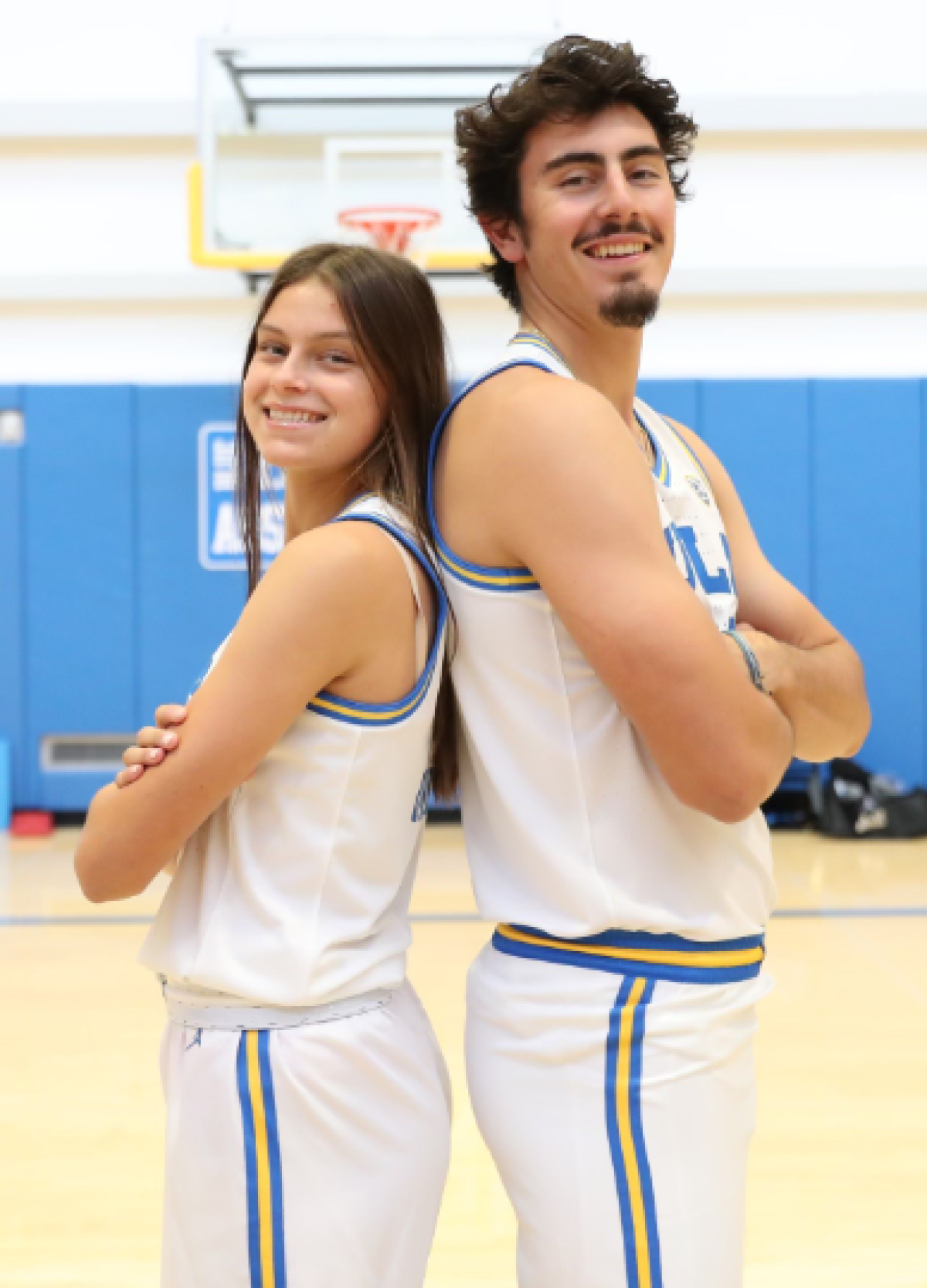
UCLA’s newest siblings have begun forging their own traditions.
They’ve strolled their new shared home, Jaime showing Gabriela his favorite Westwood Village spots. They lingered over heaping Mediterranean bowls from Cava, while Gabriela imagined what it might feel like heading to her first class.
In a living arrangement that will match that of their sibling predecessors, Jaime plans to live in an off-campus apartment while Gabriela resides in a dorm. They have vowed to go to as many of each other’s games as possible, sharing a vision for how they want their seasons to end.
“I mean, we both want to win a national championship,” Gabriela said. “That’s obviously the ultimate goal.”
It would be history repeating itself, a brother and sister lending their names to a legacy.
More to Read
Go beyond the scoreboard
Get the latest on L.A.'s teams in the daily Sports Report newsletter.
You may occasionally receive promotional content from the Los Angeles Times.

